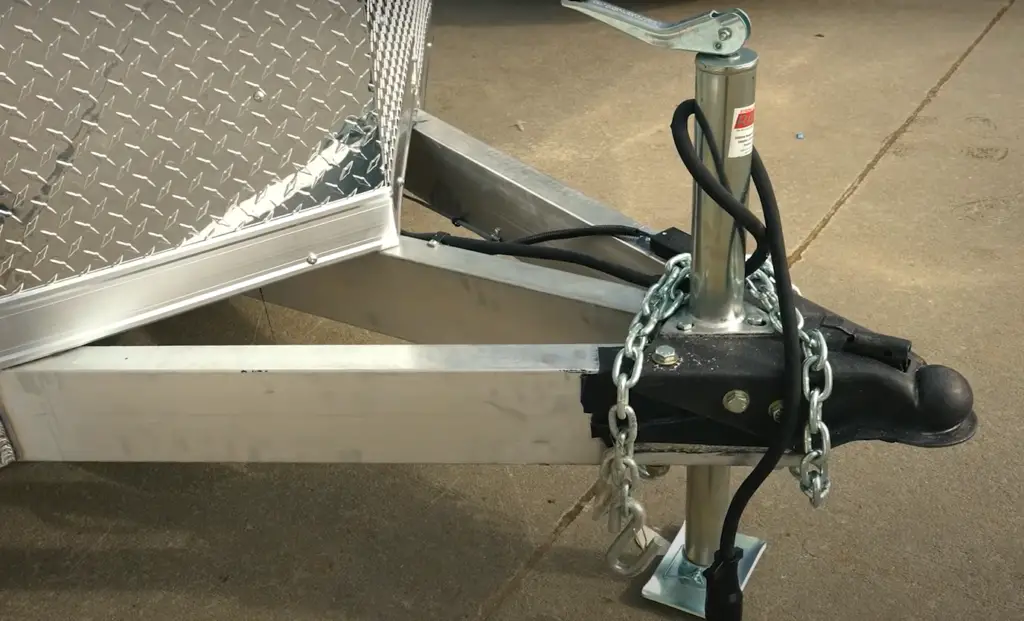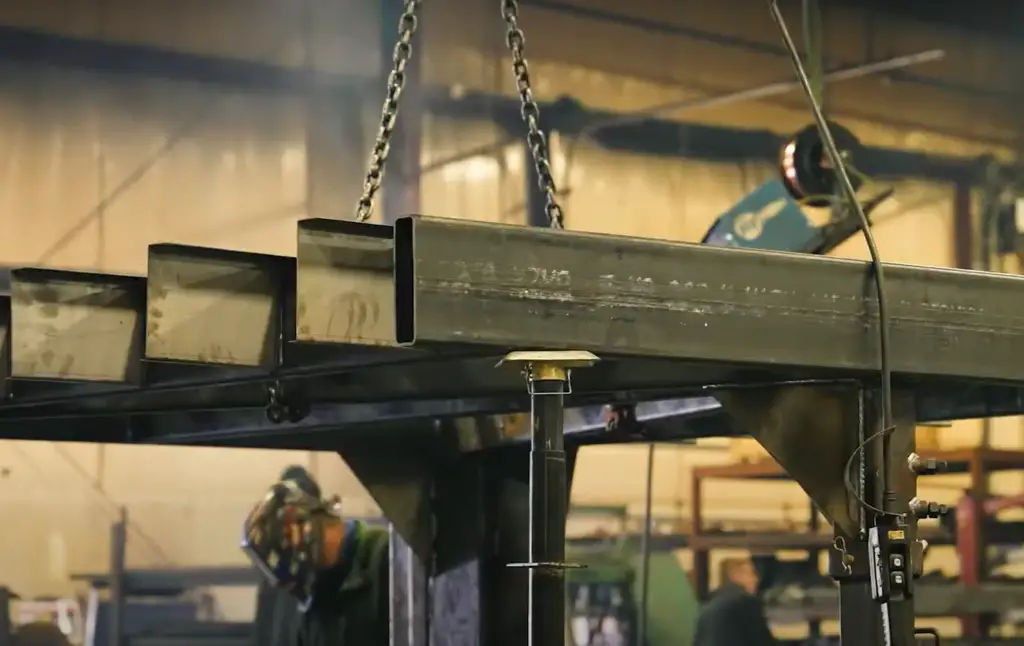Aluminum trailers are known for their durability and lightweight, making them ideal for carrying camping gear or small boats. But if you’re looking to get the most out of your trailer investment, you should understand how much an aluminum trailer weighs and what factors will affect that weight. Read on to learn all about aluminum trailer weights and how to make the most of your purchase.
Are aluminum trailers good?
Yes, they are. Aluminum trailers are a great choice for most applications due to their lightweight and durability [1].
Pros:
Here are some of the benefits they offer:
- Lightweight and durable construction;
- Less susceptible to rust and corrosion;
- Easy to maneuver and transport;
- Cost-effective compared to other materials;
- Not prone to dents or scratching from loading/unloading.

Cons:
However, there are some drawbacks to consider when choosing an aluminum trailer:
- More expensive than steel trailers when comparing similar sizes;
- Limited customization options due to the lack of welding ability with aluminum material;
- Lower payload capacity than a steel trailer of comparable size;
- Can be more difficult to repair if damage occurs.
Why is it important to know the weight of an aluminum trailer?
Knowing the weight of your aluminum trailer is important for many reasons:
- It provides you with a good idea of how much weight you can safely load onto the trailer for transport;
- It helps you to determine if your vehicle can tow the loaded trailer without exceeding its capacity;
- It’s important to consider this information when selecting a tow vehicle as some vehicles may not be able to handle certain weights of trailers.
What determines the weight of an aluminum trailer?
The weight of an aluminum trailer is determined by the following factors [2]:
Frame Construction Materials and Design
The materials used in the frame, and its design, will impact the weight of your aluminum trailer.
Other frame designs such as box or lattice style can also affect the trailer’s weight.Trailer Size and Dimensions
The size of your aluminum trailer, and its dimensions, will determine how much it weighs. Bigger trailers require more material and therefore weigh more than smaller ones. The length, width, height, and depth of the trailer should all be considered when considering aluminum trailer weights.
Flooring and Sidewall Materials
The flooring and sidewall materials used in your aluminum trailer will also affect its weight. Standard aluminum decking is lighter than heavier plywood or other types of flooring materials, while lightweight aluminum panels are often used for the walls to reduce the overall weight of the trailer.
Roofing Materials and Design
The materials used in the roof of your aluminum trailer can have a significant impact on its weight.

Lightweight plastic or metal roofs are often utilized, while heavier composite materials may be required for more extreme conditions or larger trailers. The design of the roof, such as dome-style or flat, will also influence the weight of an aluminum trailer.
Additional Features and Customization Options
The weight of an aluminum trailer can also be increased by added features such as doors, windows, and hardware. Doors or windows that are larger than the standard size will usually weigh more due to their thicker frames and the use of additional material. Additional hardware, including locks, latches, hinges, lights, or a jack stand may also add to the total weight.
Cargo accessories such as ramps or tie-down straps will increase the overall weight of the trailer. Buyers need to consider these features when determining how much their trailer will weigh before making a purchase. Depending on where you live, there may be local laws regulating the total allowable weight of trailers used on public roads to ensure safety and compliance with vehicle weight limits.
What is the weight of a standard aluminum trailer?
The weight of an aluminum trailer can vary depending on its size, purpose, and features, but here is an approximate guide to help you get an idea [3]:
Lightweight aluminum utility trailers
Lightweight utility trailers are best used for transporting small loads, such as lawn equipment, tools, camping gear, and recreational vehicles.
Examples and average weight range:
- 5 x 10 Utility Trailer: 200 – 500 lbs;
- 6 x 12 Utility Trailer: 300 – 700 lbs;
- 7 x 14 Utility Trailer: 400 – 900 lbs.
Enclosed aluminum cargo trailers
Enclosed aluminum cargo trailers are the perfect choice for bigger items that need to be kept secure from wind, rain, and other elements. These trailers come in a variety of sizes with additional customization options available.
Average weight range based on size and customizations:
- 6 x 10 Cargo Trailer: 700 – 1.000 lbs;
- 7 x 12 Cargo Trailer: 900 – 1.200 lbs;
- 8 x 14 Cargo Trailer: 1,000 – 1.500 lbs.

The weight of an enclosed aluminum cargo trailer is affected by its size, the materials used for construction, customization options added, and additional features such as doors, windows, and hardware. The total weight may also be increased with heavier cargo such as furniture or appliances.
Aluminum horse trailers
Aluminum horse trailers are designed to provide safe and secure transportation for your horses. The weight of the trailer will vary depending on the number of horses it is designed to transport.
Larger models such as three or four-horse trailers can weigh up to 3.000 lbs [4].The weight of an aluminum horse trailer may also be affected by the addition of extra features, including:
- A tack room;
- Dividers;
- Ramp.
Installing these items will add to the total weight capacity of the trailer and should be taken into consideration when calculating its overall weight. Additional cargo such as saddles and other horse equipment can also increase the amount of weight that needs to be towed. While aluminum trailers are lightweight and durable, they should still be loaded following the manufacturer’s guidelines to ensure their safety and longevity.
Aluminum boat trailers
Aluminum boat trailers are a great choice for transporting and storing your boat. These lightweight and durable trailers come in various sizes and can be custom designed to fit the size of your boat. The weight of an aluminum boat trailer is largely determined by the size and type of boat it is designed to transport.
Larger boats require heavier trailers while smaller boats may only need a lightweight frame. The type of materials used to construct the trailer will also affect its weight, with aluminum being much lighter than steel or other metals. Additional features, including extended tongue lengths or larger wheels, may add to the total weight capacity of the trailer.
Key considerations for safely towing boats on aluminum trailers
When towing a boat on an aluminum trailer, you should follow the manufacturer’s guidelines and local regulations to ensure safety. Make sure your vehicle has enough power to safely pull the trailer, and have the proper hitch installed. Always use caution when loading and unloading your boat, checking that all parts of the trailer are secure before each trip. Never exceed the weight limits of your aluminum trailer or vehicle so that you can enjoy safe and enjoyable trips with your boat.
What effects does weight have on a trailer?
Weight is an important factor to consider when selecting the right trailer for your needs, as it will affect both the towing capacity and the performance of your vehicle. Here are some specific ways that weight affects a trailer:
Legal considerations and regulations for towing trailers
When towing a trailer, you should know the local laws regarding vehicle weight limits. Many states have laws that limit how much weight a vehicle can tow safely on public roads.

Exceeding these limits can result in fines or other penalties, so always check your local regulations before investing in an aluminum trailer.
Safety implications of exceeding weight limits
It is also important to consider the safety implications of exceeding the weight limits when towing a trailer. Overloading your trailer can cause dangerous handling conditions, leading to instability while driving and increased braking distances. Too much weight on board may make it difficult for your vehicle to turn or stop safely.
Fuel efficiency and performance impact
The total weight of your trailer will affect your vehicle’s fuel efficiency and performance. Heavy trailers require more power to pull them, resulting in decreased fuel economy. The stress put on a vehicle when pulling a heavy load can cause it to wear out faster or break down sooner than if it were not overloaded.
Weight Management Tips: Hints for a Better Towing Experience
When towing a trailer, you should ensure its weight is properly managed for the best possible experience. Here are some useful tips to help you:
Understanding trailer weight ratings and legal limits
When selecting an aluminum trailer, you should understand the manufacturer’s recommended weight rating and local laws regarding vehicle weight limits. Exceeding the weight rating of your trailer can put you and other drivers at risk, so be sure not to overload it.

Ensure to check with your state or local regulations before loading your trailer to ensure you are within the legal limit.
Importance of proper weight distribution and loading techniques
It is also important to consider how the load is distributed on your aluminum trailer when planning a trip. Properly distributing the weight will help keep your vehicle stable while driving and ensure its overall safety. To achieve an even weight distribution, make sure to evenly distribute the load across both tires and axles of your trailer.
How to reduce trailer weight without compromising functionality or safety
If you find that your aluminum trailer is too heavy, there are some steps you can take to reduce its weight without sacrificing functionality or safety [5]:
- If possible, remove unnecessary items or cargo from your trailer before embarking on a trip;
- Consider different materials when building or repairing your trailer; aluminum is lighter than steel and other metals;
- Utilize lightweight components such as plastic wheel covers or fiberglass fenders to reduce the total weight of the trailer;
- Use multi-purpose items like collapsible chairs instead of heavier camping furniture where possible;
- Choose air-filled tires over solid ones for added weight savings and improved suspension quality while driving;
- Downsize your boat to a smaller model if the current one is too heavy for your vehicle’s capacity or local laws;
- Utilize lightweight accessories and gear to reduce overall weight;
- Take extra care when loading the trailer; avoid overfilling or unevenly distributing the load as this can cause instability while driving;
- Limit your cargo to only essential items; anything extra increases the weight unnecessarily;
- Make sure all parts of the trailer are secure before embarking on a trip by checking all straps and tie-downs frequently;
- Consider renting a trailer with a larger capacity if necessary;
- Look for ways to improve aerodynamics, such as covering the trailer with an awning or using improved wheel covers;
- Cushion heavy items to limit possible damage, and reduce their overall weight;
- Utilize lighter materials for the interior of your trailer; aluminum is a great choice for both strength and lightweight performance;
- Invest in high-quality components that can withstand wear and tear while helping reduce the total weight of your trailer;
- Utilize lighter materials or different construction methods when building an aluminum trailer;
- Choose a tow vehicle with more power to make up for the additional weight of your heavy trailer;
- Use less fuel-heavy items, such as electric motors for boats, instead of heavier gasoline engines;
- Inspect and maintain your trailer regularly to ensure all components are working properly and that there are no excess materials or items;
- Invest in a trailer scale to monitor the weight of your trailer before each trip. This will help you avoid potential overloads while on the road.
FAQs
What is the weight capacity of an aluminum trailer?
The weight capacity of an aluminum trailer will depend on the specific model and its features. A single-axle aluminum utility trailer of 6’x8’ in size can weigh from 500 to 600 lbs while a tandem-axle aluminum cargo trailer of 7’x14’ could range from 1.700 to 2.200 lbs depending on the features included. It is important to know the exact weight when purchasing an aluminum trailer so that you do not exceed your vehicle’s capacity for safe transport.
What type of aluminum is used for trailers?
Aluminum trailers are made of high-grade alloys, such as 5052 or 6061 aluminum. This type of aluminum is strong and lightweight, making it ideal for trailer construction. On top of that, it is highly resistant to rust and corrosion, which makes it a good choice for long-term use [6].
Is an aluminum trailer stronger than steel?
Yes, it is. Aluminum trailers are generally stronger than steel trailers due to their lightweight nature. This metal is also resistant to corrosion and rust, which can cause damage over time in steel trailers.
How do you maintain an aluminum trailer?
Maintaining an aluminum trailer is important to ensure its longevity and proper functioning. It is important to perform regular maintenance, such as cleaning and lubricating the parts regularly, checking for signs of wear and tear, replacing parts as needed, inspecting the brakes and tires, and ensuring that all lights are in working order. You should be sure to inspect your trailer after each use to ensure it is still safe for operation.
Will an aluminum trailer rust?
Aluminum is a highly corrosion-resistant material, so aluminum trailers do not rust. However, it is important to clean and regularly inspect the trailer for signs of wear and tear as certain conditions can accelerate corrosion. If you store your trailer outdoors, be sure to use a cover to protect it from the elements.
Are aluminum trailers lighter?
Yes, they are. Aluminum trailers tend to be lighter than steel or other metal trailers. Additionally, you can reduce the weight of your aluminum trailer by selecting lightweight components and making sure not to overload it.
What is the problem with aluminum trailers?
The main problem with aluminum trailers is that they are susceptible to corrosion. It is important to inspect and maintain your trailer regularly so that any areas of corrosion can be addressed quickly and appropriately. Ensure not to overload aluminum trailers as it can cause undue stress on the frame or axle and lead to premature wear and tear over time.
How do I keep my aluminum trailer from oxidizing?
To keep your aluminum trailer from oxidizing, you should clean and seal any exposed metal on the trailer. Ensure to inspect all areas of the frame regularly for signs of corrosion or rust. If you do find any discoloration rust, you should address the issue quickly with a cleaning agent such as distilled white vinegar or a mild detergent. Consider applying wax or sealant to the frame and any exposed metal surfaces to protect them from moisture and oxidation.
Useful Video:
Useful Video: Cleaning Burned On Grease From Stainless Steel
Conclusion
Aluminum trailers are a great choice for those looking for a lightweight and durable option. Knowing the approximate weight of an aluminum trailer can help buyers make an informed decision that best meets their needs at a good value. When selecting an aluminum trailer, you should consider legal regulations regarding weight limits and how the total weight of the trailer will affect your vehicle’s performance and fuel efficiency. Regular maintenance should be performed to ensure the trailer’s longevity and safety.
References:
- https://mgtrailer.com/blog/steel-vs-aluminum-trailer/
- https://www.curtmfg.com/trailer-weight/
- https://www.sylvansport.com/trailer/aluminum-utility-trailer/
- https://www.curtmfg.com/trailer-weight/
- https://rvblogger.com/blog/best-ways-to-reduce-rv-weight/
- https://www.metalwest.com/aluminum-what-it-is-used-for/






